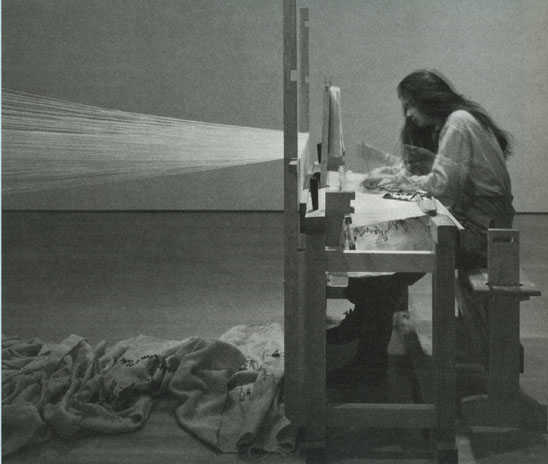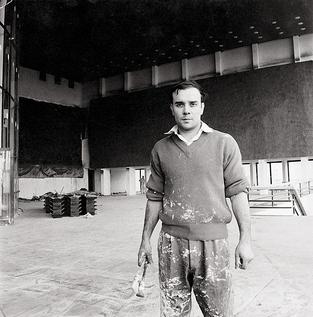Ana Mendieta
Ana Mendieta was born in Havana, Cuba in the year 1948, and was exiled from her native land at the age of 12, when her politically established parents decided upon her relocation to the United States, succeeding Fidel Castro's overthrow of Batista's authoritarian government. Along with her fourteen year old sister, Mendieta spent the beginning of her time within Iowa in refugee camps and a string of foster homes. This cultural displacement which erupted due to being separated from her homeland in her adolescence, immensely manifested itself in her future art practice, through a focus upon unifying the human body with the earth, drawing spiritual and physical extensions to the rest of nature. She establishes the manner in which she experiences this connections, with descriptions of her work being a vessel utilized to reconnect bonds that have been severed from the omniscient external, paralleling this to a disunification from the feminine womb.
"I have been carrying out a dialogue between the landscape and the female body (based on my own silhouette). I believe this has been a direct result of my having been torn from my homeland (Cuba) during my adolescence. I am overwhelmed by the feeling of having been cast from the womb (nature). My art is the way I re-establish the bonds that unite me to the universe. It is a return to the maternal source."
[sourced from Mendieta's 1981 artist statement regarding her "silueta series"]
“My art is grounded on the belief in one universal energy which runs through everything; from insect to man, from man to spectre, from spectre to plant, from plant to galaxy.”
Her performative "earth-body sculptures" (as she referred to them), documented through film, video, and photography, relate to conceptualizations of reunification, regeneration, burial, inherent connectivity to the rest of nature comprised within the universe, as well as relative permanence and ephemerality. These thematic consistencies were relayed through imprinted or inscribing her own body into natural environments, utilizing elements such as fire, water, and blood, and presenting an ambiguity in time period of construction, whether transversely ancient or modern - which is symmetrically reflected through the lack of distinction in the transformative characteristics of the surfaces she marks (this stone which possesses a frame of time through its memory of fossilization, will dually weather and disappear, as we do in concurrence).
| Tree of Life, 1979 {an image documenting one of her "earth-body sculptures", in which she positions her body in such a manner so that the plants look as if they are sprouting from within her form} |
| On Giving Life, 1975 {Within this series of performative actions, Mendieta metaphorically discussed the concept of regeneration, through visually unifying life and death; this by initially studying the skeleton, enveloping its face and hands with pink plasticine, and then lying atop the form.}
Links including Portions of her Films:
"Blood Sign" - https://youtu.be/GhEbM-Cz-AA
Janine Antoni

Mendieta is a predecessor of Janine Antoni, who engages similarly in their series' of performative actions, being able to find her nature within sets of habitual activities - this leads to reoccurring patterns of not being able to define where the making and finishing lie within the work. She was born in the Bahamas Islands, within the year 1964. An Overpowering focus exists upon process and the utilization of her bodily form, using eyelashes, saliva, and hair.
 
"Slumber", 1993
{Over an eight day period, Antoni recorded her brain wave signals of rapid eye movement (REM) on an electroencephalograph (EEG) during her sleep, and upon her waking she recorded the patterns from the resulting REM graph through weaving them on a blanket, produced from pieces of her nightgown} 
Touch, 1964

Moor, 2001
{In "Touch", Antoni walks across the horizon, balancing on a line she created in "Moor'", which was conceptualized through the relationship between two distant ports, with collections of materials sourced from humans who possess intimacy within her life, which she outlines in specificity with the descriptions held inside of an correlating book.} Excerpt from the book Moor by Janine Antoni, 2003:
"(…) and Paul’s shirt is entwined with Melissa’s skirt accidentally
acquired when she left a house sitting situation which did not end on the best
of terms and she did not stay in contact with them, nor did she return the
skirt and Melissa’s skirt is entwined with an Oscar the Grouch scarf that was a
gift from her sister and she never favored the color or the length or the style
and in fact, it is more like something her sister would buy for herself than
something Melissa would actually wear and Melissa’s scarf is entwined with
leftover gray fabric from Danielle’s sculpture The Pet and she loves this
sculpture despite all of its problems and it looks like a big rock and has a
camera that films itself and a little of what is behind it, and it has also a
leash so you can take it for a walk and, although it doesn’t need pet food, it
is very high maintenance and Danielle’s fabric is entwined with Doug’s
industrial power cord from 1992 when he moved into the studio above mine on
Warren Street and Doug’s cord is entwined with my brother Brian’s favorite
shirt that reminds him of (…)"
 Lick and Lather, 1993 {Antoni created a mold of herself with a product referred to as "alginate", then formed two casts out of chocolate and soap, resculpting the busts through a process of licking and bathing, respectively. She manifests the ability to be outside of oneself, as well as to have a relationship with her own image, in a loving manner, with the pieces gradually evolving into fetus-like objects, with all features of their facades dulling into blunts.}
Antoni Discussing her Exhibition "Within" - http://www.art21.org/videos/short-janine-antoni-milagros
Yves Klein 
Yves Klein was born in 1928, in Nice, France, creating two-dimensional, sculptural, and performative pieces. The visually communicative environment he developed within as a child, was inclusive of his abstractly-expressing mother, who was a paramount figure in the Art Informel movement, and his father, who painted in a stylistically post-impressionistic, figurative manner. Before transferring to engaging in an art practice, his focuses were upon judo and spirituality. He was deeply attracted to monochromatic color relationships, with ultramarine blue being continuously associated with him. His performative pieces include "Anthropométries" in which he utilizes the female nude as "pure color" and "living brushes".
|

Leap into the Void, 1960

Anthropometries of the Blue Period, 1960
Links inclusive of Performative Works:
"Anthropometries of the Blue Period" and "Fire Paintings" -https://youtu.be/1mJCVM3d7jw
